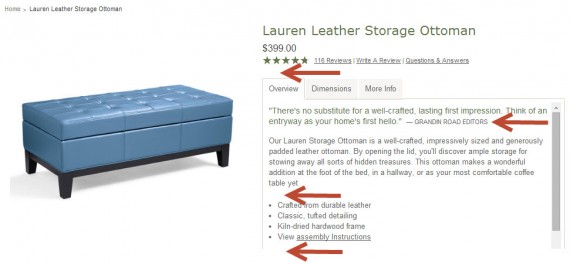Customer reviews are an excellent way to inject unique content into your site to benefit search engine optimization while boosting shopper confidence at the same time.
For SEO, reviews fall under the generally beneficial category of user generated content. Because UGC comes from consumers, it’s written in their language instead of the marketing-speak we tend to let slip into web copy.
One of my favorite examples of the difference between marketing speak and customer speak is the now-ubiquitous hooded sweatshirt —i.e., the hoodie. When hoodies first became popular, clothing manufacturers and retailers insisted on calling them “hooded sweatshirts.” Shoppers, however, were searching for “hoodies.” Those sites with reviews embedded in their product pages benefitted from the use of the word “hoodies,” giving them a relevance boost for SEO and a better chance of ranking.

Gap.com has a “hooded sweatshirts” category and “hoodie” product names. Customers in reviews frequently use the word “hoodie.”
More and more retailers are using user reviews in catalogs to boost consumer confidence in specific products. The cover of a recent catalog for home decorating products retailer Grandin Road featured a hero shot of its most expensive leather ottoman, with a pull quote claiming “The Perfect Ottoman.” Your attorney may have a fit if you claim your product or brand is perfect or the best. But when your shoppers claim it for you in reviews, all you’re doing is quoting their opinions.
This Grandin Road catalog goes on to further expound on the Lauren Leather Storage Ottoman’s perfection on page three, again citing consumer reviews and the high percentage of five-star ratings. What Grandin Road does not do, however, is use this excellent tactic on its website.

Grandin Road displays three customer review quotes in its catalog, but fails to use them on the website.
Yes, Grandin Road uses Bazaarvoice to capture and display reviews on its product pages. And in the case of this particular ottoman, many customers actually use relevant keywords when they leave their positive reviews. The keyword “ottoman” is used eight times in the first page of reviews; “storage ottoman” is used three times; “chest” is used four times; the exact product name is used twice.
This review, below, is a prime example of customer language benefitting SEO.

This review for Lauren Leather Storage Ottoman contains helpful keywords — i.e., “ottoman.”
Unfortunately, only the first page of the 116 reviews this product has received is crawlable on the product page because JavaScript is required to load the next pages. In addition, new reviews are coming along to push past reviews down onto pages two and higher. While that’s a positive in terms of freshening the page’s content regularly, it also means that the benefit the product page receives is variable. A product may receive a large keyword relevancy boost from reviews today, but next week reviewers may leave reviews that contain no real keyword benefit.
Not all reviews are beneficial to SEO. The benefit is more about the keywords used than the positive or negative sentiment, although Google is working on determining sentiment as well. For example, consider this positive, five-star review.

This review for Lauren Leather Storage Ottoman could apply to most any product.
This review could be about any product at all, and thus it has essentially no SEO keyword relevance benefit.
Reviews are beneficial to SEO when the customer uses keywords that agree with the page’s keyword theme. One way to ensure that the best reviews always benefit a page’s SEO is to use the review pull quote method demonstrated in Grandin Road’s catalog on the website as well. Make review quotes an attractive design element.
For example, the template for Grandin Road’s product pages could be modified to accept short quote snippets. These quotes would need to be displayed in HTML text, rather than as an image. But they can be styled to make the presentation consistent with your brand. These more visible quotes would then permanently affect the keyword relevance of the page, and also serve as visible proof points to customers considering the product.

Grandin Road’s product page with red arrows indicating areas that textual review quotes could be added.
If template changes and high visibility concern you, try adding keyword rich review quotes to your product descriptions. The image above shows three areas within the product description where review text could be inserted – choose one. Grandin Road already uses a quote, interestingly, but it’s from its own editorial department and contains no keyword relevance. A positive customer quote with a keyword would be much more beneficial to SEO and shopper confidence.
Don’t feel like every page has to have a review quote. Start small, with the products that earn the highest margin or that need a boost in SEO performance.
Category Pages, Too
Consider also using customer review quotes for category pages. It can be difficult to write interesting copy for category pages, but it’s increasingly important to SEO, with Google’s Hummingbird algorithm changes. Mining reviews for category-relevant review quotes can help ease the burden, increase the amount of unique textual content on category pages, and inspire you to write better descriptive content for category pages based on the things customers are excited about.
Reviews vendors like Bazaarvoice are fantastic sources for mining keyword-rich quotes for SEO benefit. They offer both a customer friendly collection mechanism on the product pages and a reporting interface for analyzing the reviews that have already been submitted.
If reviews vendors are simply too expensive for your budget, there are other sources. Social media comments and posts from customers can result in valuable quotes. Ask your customer service team to record positive comments from consumers calling in. Collect comments from product testing, or even from website user experience testing. Review the answers to open-ended questions in online surveys.
Any interaction — digital or in person — can result in a quote that can benefit the keyword theme on a page of your site. It’s a matter of training yourself to look for the keyword value in these interactions and having a place in your page templates to capitalize on that value.
I have had no contact with Grandin Road professionally. I do, however, receive the Grandin Road catalog in the mail and I actually did purchase the ottoman mentioned in this article. The use of reviews and ratings information on Grandin Road’s cover and the first pages of the catalog did sway my opinion, both as a customer and as a search marketer.


